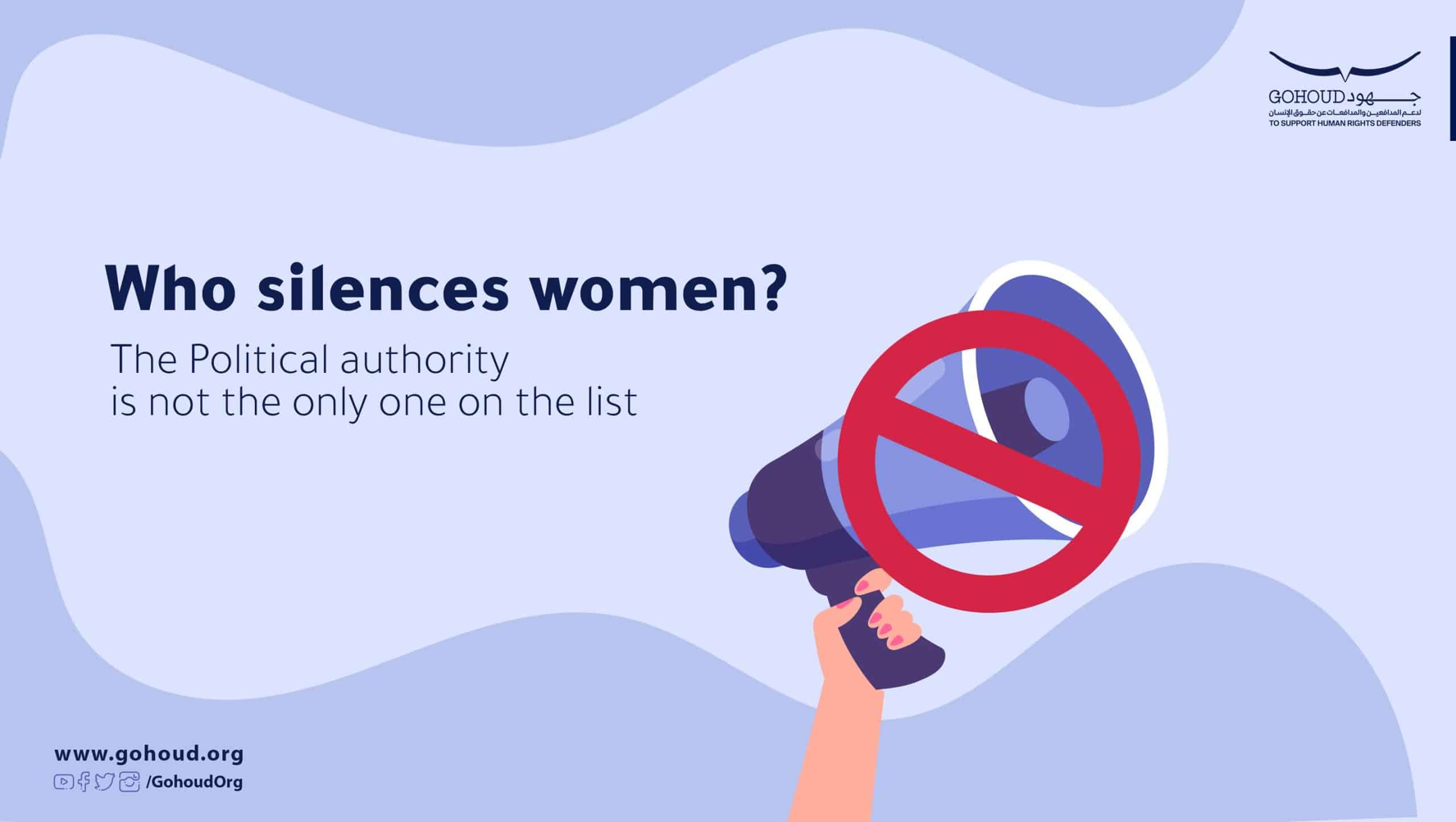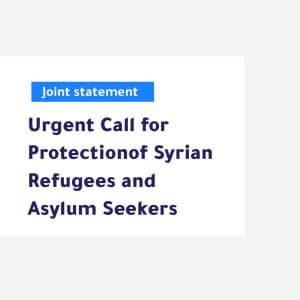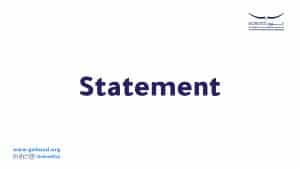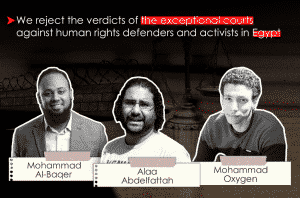Who silences women? The political authority is not the only one on the list

About the author:
Journalist and human rights defender
There were moments of suspense, worrying and enthusiasm simultaneously before the announcement of the award-winning investigation, followed by an overwhelming joy and big applause flooding the hall which included a large number of journalists from Egypt. That was one of the regional press events, during which a number of pieces were selected among the finalists of best investigations of the year, before the award went to my Egyptian colleague for his investigation published a few months earlier. With great enthusiasm, I got off my seat to join in the applause, just a moment before I felt that pain in my heart when I realized that I could not turn to my friend to congratulate him in order not to reveal his identity. We settled for some exchanged glances tinged with fear and worry in order not to get caught and thus his identity unfolds, while he could not even receive his award or express his happiness because had to publish his investigation under a pseudonym to avoid the security risks in Egypt.
At first, I thought that the inability to support and congratulate my friend for his unique investigation winning, as assessed by an international committee including senior journalists from all over the world, was the main reason for the bitterness I felt at the time. Eventually, I realized that the situation then just touched a nerve. Given the fact that Egypt ranked 166 out of 180 countries on the 2021 World Press Freedom Index issued by Reporters Without Borders that described Egypt as one of “the biggest prisons” for journalists.
Later on, I also realized that recalling the deteriorated status of the press and increased restrictions on freedom of expression for journalists in Egypt, was not the only cause of the pain I felt then. Days after the event, I remembered that I also had to publish an article under a pseudonym where I tried as much as possible to hide my identity, despite being a personal experience with sincere thoughts and feelings that I wish I could share with my real name. I was fully aware of the price I would pay, if my name went public on such a piece, which was risky and totally unbearable. Therefore, I preferred to use a pseudonym as well. Additionally, I could not share the article on my social media as I usually do with other publications.
Surprisingly, the article did not have any political or opposing situation. It had nothing to do with political authority. Thus, technically, it has a nearly zero risk in terms of security matters (political security). However, there was another kind of risk if anyone just googled my name and it appeared at the top of the article. The reason here is nothing except the fact that I am a woman. At this moment, I realized that there are several kinds of oppression to freedom of expression, one of them is specially created for women since it would have been definitely different if the writer was a man.
A female-only authority
I remember very well the day when my father rushed to my room asking to “review” some of my video publications I was producing at the time. He said he was “reassuring” the type of content I produce, and “deciding” whether it is suitable or not. Months earlier, there was another incident when he also “heard” that I am participating in a theater acting workshop. He asked (or actually ordered) me then to immediately stop it and withdraw from the play which he did not even bother himself to know what it was about. Many similar incidents recurred over the years, before I completely surrendered to the fact that I am under a certain type of “surveillance”, in which the political authority is not the only actor, despite being involved of course. There were many different eyes stalking me on cyberspace and social media or any public platforms, and regularly informing the family (thus the society) about all my movements, shared posts and any kind of knowledge production I participate in as well. Again, the only reason for that is me being a woman and nothing else.
With the idea settled in my mind, I had to develop another survival method to be able to continue my work and, at the same time, hide not only from political power but from social power as well. For instance, I started a few years ago by filtering my personal accounts from any suspicious person who might be “spying” on me, to avoid disputes with the family which may lead to forcing me to leave my job, or at least cause me many troubles or unnecessary psychological wars including accusations of “madness”, “atheism”, “immorality” or any of those accusations faced by women whenever they dare to differ from the traditional roles or choose another pathway other than what is socially imposed in order just to control over women and deprive them from the basic rights such as freely expressing themselves, sharing thoughts or discussing their issues.
Stifling refuge
“After Sara Hegazi died, I realized how harmful and ignorant this society is. Even those whom I thought were kind. I was really shocked by the amount of hatred for a harmless person who did not pose any threat. She is a dead person already. How about a living person who publishes about different ideas? This is a safe way to protect myself from stigmatization, defamation, inquisition..etc, that might be harmful for me or my people”.
I received this message from my friend, another female journalist who had to anonymously publish some of her work to protect herself, and to survive dangers that might be faced if she discusses a “socially sensitive” subject.
Anonymity and resorting to pseudonyms in women’s writing are not new practices. Many female writers in the eighteenth and nineteenth centuries have published their contributions using pseudonyms, often masculine names. The English writer Virginia Woolf points out in her book “A Room of One’s Own”, that using men’s names in female writings was like a “refuge” for them, for the sake of “the relic of the sense of chastity” that remained even so late as the nineteenth century. She also mentioned examples of Currer Bell, George Eliot, George Sand as male names used by women who wrote during such era, describing them as “victims of inner strife”. However they resorted to veiling themselves with men’s names, so that they “did homage to the convention” encouraged by men, that forbade the publicity of women.
In a nutshell, male domination over women’s writings started a long time ago, when women struggled to express themselves in societies rejecting them to slough off the crucible of patriarchy, or allow them to speak publicly about their concerns and their desperate attempts to express their experiences, in light of the male oppression they live within, hundreds of years ago.
As a feminist activist, writing and publishing under a pseudonym has sometimes become my way to avoid the social pressure when I write about some topics that are still considered “taboos”. Such pressure that could amount to direct harm or violence for being a woman, not to mention being a feminist who considers journalism as one of the most important tools of struggle, to contribute to social change in favour of women and defending their rights.
Anonymity may provide some freedom for women to discuss topics that they may not be able to talk about with their real identities, as this could be dangerous for their personal safety. Hence, it became a refuge for many female journalists and writers in Egypt and the Arab world, as it provides us with some protection from the risks that we may be exposed to if our identities were revealed. Also, it gives us the opportunity to express and discuss our ideas and allow women’s voices to be heard as much as possible. However, anonymity is just a reminder that there must always be complex challenges which are made specially for women, in addition to the other general challenges shared with men. Therefore, even if freedom of expression and security risk-free spaces are restored, it will not be sufficient for women to talk about their issues or discuss their analytical or critical visions of what is going on in private or public spheres, that the reason behind the presence of such challenges in the first place was that we are women, as if reality is trying to tell us: “You are a woman… then you have to pay the price”.





